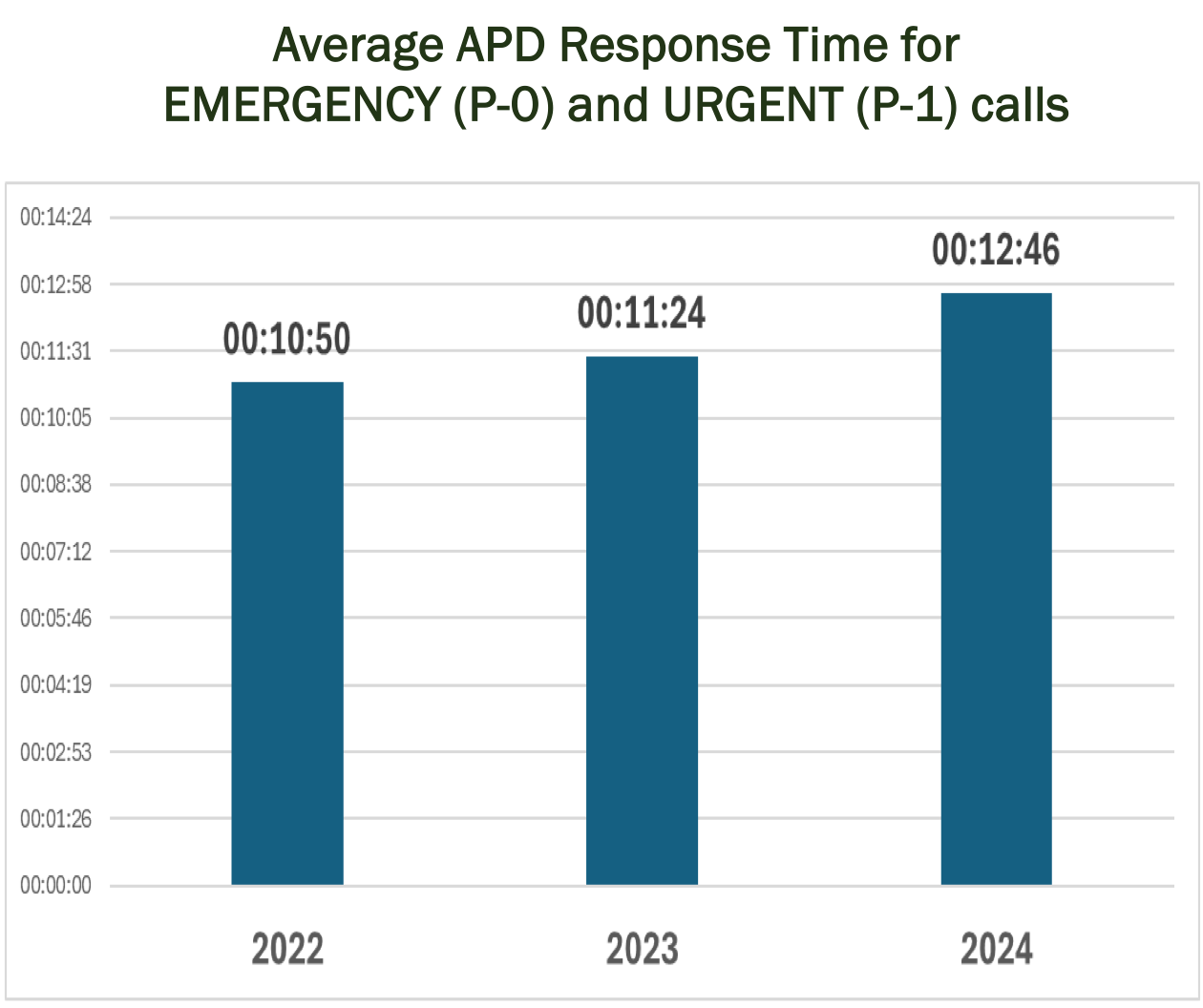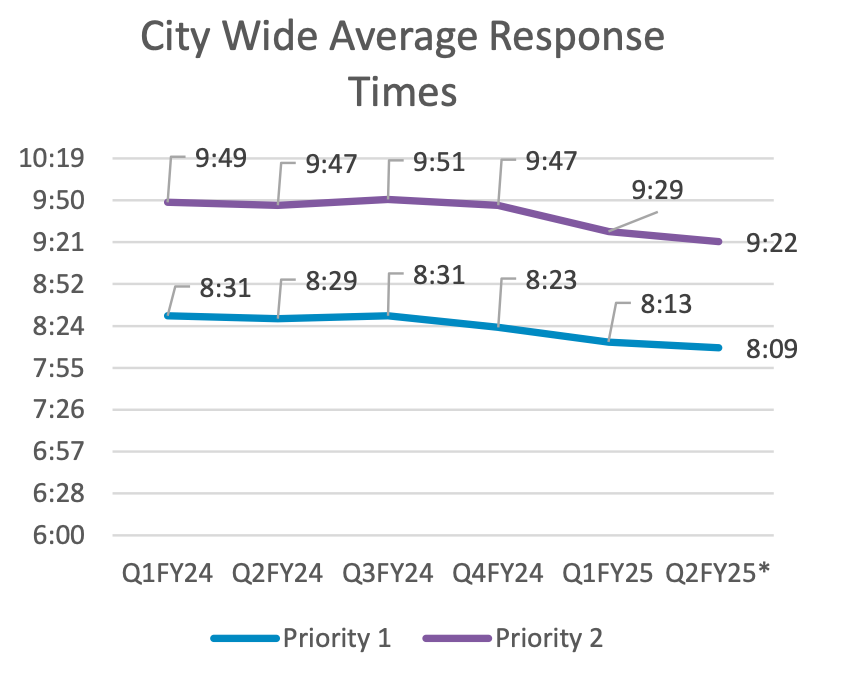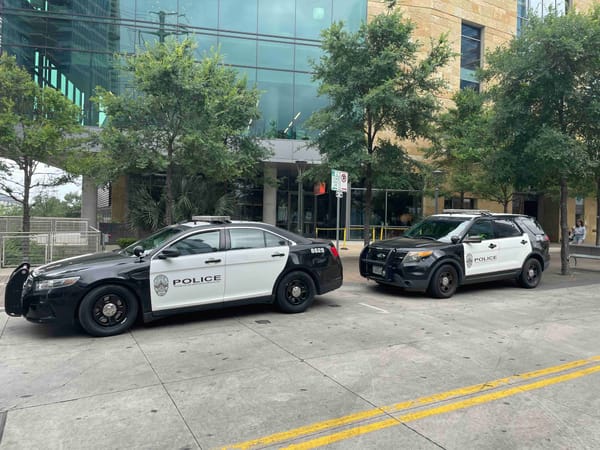Response time isn't everything
We need other data points for assessing police quality.

We got some good news on the crime front.
APD says violent crime, which includes murder, rape, aggravated assault, and robbery, decreased by 8.3% last year. And in the first three months of 2025 there have been 12 murders, which puts us on pace for 48 this year, a decline from the roughly 65 murders per year in the three previous years.
APD has also begun to make progress on reducing vacancies, which currently stand at 316, down from more than 350 a year ago.
An even more dramatic staffing turnaround has come at the 911 center, which two years ago had more than 60 vacancies and was regularly putting callers on hold. There are now only 18 vacancies, and the percentage of calls that are answered within 15 seconds has climbed from 75% to 93%.
So, in light of all of this progress, why is it taking APD longer on average to arrive at the scene of a crime than it did two years ago?
According to a recent presentation given by APD to the City Council Public Safety Committee, the average response time to the highest priority calls took a minute and 22 seconds longer in 2024 than in 2023.

In its presentation, APD suggested some factors driving the longer response time, including population growth and street disruptions linked to construction. The Fire Department offered a similar explanation for its own increase in response time.
Here's another possible explanation they didn't offer: the data is total dogshit.
I'm not saying that's definitely the case. But it's a distinct possibility given how bad APD is at data management (so many examples) and how fluid the definition of something like "response time" is –– and how vulnerable it is to manipulation for political purposes.
For instance, a decade ago, as it sought to impress on City Council the need for increased staffing, APD reported that patrol officers' "uncommitted time" –– time when they were not responding to 911 calls –– had abruptly plummeted.

I wrote about this issue in the run-up to a ballot proposition in 2021 that would have required the city to not only maintain a certain police-to-population staffing ratio, but would have required that 35% of patrol officers' time be uncommitted (or "proactive"). Here's what I wrote at the time:
Now, just look at the red line. Does that make sense to you? How could patrol officers’ uncommitted time have dropped by half between 2011 and 2013? The city did not double in population during that time, the police force did not shrink and crime actually decreased during that timeframe.
My guess is that nothing much changed except the way they were estimating "uncommitted time." Maybe it was intentional, maybe not.
But regardless of the quality of the data, I think we focus way too much on response times, at least when it comes to policing. I think there is a natural inclination to focus on response time because it aligns with a Hollywood notion of policing where they are constantly rushing off to do battle with bad guys.
Much of the time, it doesn't matter whether an officer arrives in 10 minutes or 11 minutes. For what it's worth, UT criminologist (and former City Council Member) Bill Spelman's research concluded that efforts to reduce response time did not appear to have much effect on whether cops were able to make an arrest at the scene.
The time it takes a cop to get to a scene matters less than what they do when they get there. They were at the scene of the massacre right away in Uvalde –– and then stood in the hallway while it continued. Fortunately, most calls for service do not involve violent confrontations, and what is most important is that the officer who responds is honest, compassionate and smart. Somebody who knows how to gain the trust of victims and witnesses, asks good questions, and has good judgment. Doesn't shoot people who don't need to be shot.
Anyway, my point is not that response time doesn't matter at all, of course it does. It makes sense to track it, but I don't think it's worthy of obsession. A police chief or a police force that is fixated on hitting an arbitrary response time metric will likely end up sacrificing other important things in service of that goal, such as investigative work.
I think response time attracts so much attention because it's the one metric for which there is a relatively simple solution: hire more patrol officers. It's guaranteed to work! Whether or not it actually makes the community safer is unclear.
What do you think? What types of metrics could be used to assess the quality of police work? I'm not willing to simply look at crime rates, because I know that there are a lot of reasons crime rises and falls that have nothing to do with the quality of the police department.
Where response time definitely matters
While both APD and the Fire Department report increases in response times in recent years, EMS has reduced theirs (pg 50), at least within the last year-and-a-half:

So that's good. When it comes to a stroke or a heart attack, seconds really do count.
If somebody forwarded you this email, please consider subscribing to the newsletter by visiting the website.





